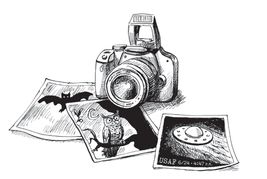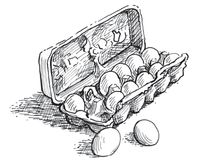Encyclopedia Brown and the Case of the Secret UFOs (6 page)
Read Encyclopedia Brown and the Case of the Secret UFOs Online
Authors: Donald J. Sobol

BOOK: Encyclopedia Brown and the Case of the Secret UFOs
10.98Mb size Format: txt, pdf, ePub
“That's easy for you to say,” said Sally. “You're not the one whose mother is having a birthday tomorrow. You're not the one who still doesn't have the perfect present.”
“True,” said Encyclopedia. “I'm also not the one who waited till the last minute to shop for her.”
“I know, I know,” said Sally. “Don't remind me. I'm sure I'll find something. My mother loves American history. Around here, there's plenty of history, though most of it is a bit dusty and crumpled. That only proves that it's old.”
They passed a booth featuring cast-iron pots and pans hanging on a string. They were jet black and encrusted with a layer of hardened grease.
“These look very old,” said Encyclopedia.
“I don't think that kind of history would appeal to her so much,” said Sally. “Let's keep looking.”
The booths were laid out in rows, and the detectives carefully went up and down each one. A couple of times they stopped to look at something closely, but there was always a problem of one kind or another.
They had come about three quarters of the way through the market. Sally was beginning to get a little nervous when they saw a high school boy with a booth of his own. A few younger kids were looking at some old toys on his table. There were three yo-yos, some tops, and a wooden chess set that somebody's dog had chewed.
“Step right up,” said the boy. “My name's Jack. Jack Higginbottom. I've got a lot of treasures here from my attic. My family has lived in Idaville a long time, so there's plenty to see.”
“I didn't know kids could rent space here,” said Sally.
“Oh, sure,” said Jack. “Everybody's welcome.”
Sally picked up a brass letter opener. “Do you have anything really old?” she asked. “Anything historical?”
“I do,” said Jack. He opened an old box. It was filled with papers. They were all yellowed and brown around the edges. “I hadn't taken these out before,” he explained, “because I didn't want the wind blowing them around.”
“Those do look old,” Sally said.
“More than two hundred years old,” said Jack. “You're looking at pages from the diary of George Washington's mother.”
The other kids at the table all stopped what they were doing to listen.
“Her name was Mary Ball Washington,” Jack continued, “and she was quite a lady. Born in 1708, she was the second wife of George's father, Augustine. They got married in 1730.”
“That's all true,” said Encyclopedia.
“Of course it is,” said Jack. “Mary, as I like to call her, had a strong opinion of herself. Women in those days, however, weren't allowed to speak their minds, and so she kept a diary. Now, if I had the whole thing, it would be worth a lot of money, but I only have a few pages.”
“That sounds perfect,” said Sally.
“I have to admit,” said Jack, “that most of the pages are concerned with everyday things like chores and life on the farm. By far the best page is the one she wrote the day after George was born.”
“What does it say?” asked Sally.
“I'll read it out loud,” said Jack. “If you don't mind, I'll handle it myself. The page is pretty delicate.” He carefully looked through the papers in the box. “Ah, here it is. Now, it's not a long entryâwhich is understandable considering that Mary was still recovering from giving birth. These are her words:
I am so impressed looking at little George lying in his cradle. Augustine and I have a feeling he is destined for great things. Why, I wouldn't be surprised if someday he grew up to be president. I only hope I live long enough to see it.
“That's amazing,” said Sally.
“Believe or not,” Jack added, “she actually did live that long. Mary Ball Washington died in 1789, a few months after her son George was inaugurated the first president of the United States.”
“That's true,” said Encyclopedia. “I'm sure she was very proud.”
Sally could barely contain her excitement. “That's the one I want! I just hope I can afford it.”
Jack smiled. “I'm sure we can work out something. I want that page to find a good home.”
“My mother will be so excited,” said Sally. “Right, Encyclopedia? Isn't it just perfect?”

“That's the one I want! I just hope I can afford it.”
Encyclopedia took a long look at Jack. “I cannot tell a lie,” he said finally. “The diary is a fake.”
Â
WHY WASN'T ENCYCLOPEDIA FOOLED?
Â
Â
Â
Â
Â
Â
Â
Â
Â
Â
Â
Â
Â
Â
Â
(Turn to page 84 for the solution to “The Case of Mrs. Washington's Diary.”)

Solution to
The Case of the Stolen Stamps
The Case of the Stolen Stamps
Encyclopedia wondered why an ordinary stamp would be stolen along with the rare ones. He also wondered why a knowledgeable thief would waste his time disturbing some stationery. Then he realized that the thief had taken something else, something Mr. Terrence hadn't noticedâan envelope.
The thief took the envelope and the ordinary stamp so that he could mail the rare stamps home to himself as soon as he left the store. That way if he was caught, he would have nothing on him. When Chief Brown checked Red Finster's mail the next day, he found the stolen stamps delivered in an envelope just as Encyclopedia had predicted.

Solution to
The Case of the Secret UFOs
The Case of the Secret UFOs
There was nothing about the alien spacecraft itself that showed the picture was a fake. The problem surfaced when Bugs said the pictures were taken by the air force. The air force, as a branch of the military, uses military time, which doesn't start the time again at noon, as standard time does. In military time 2:05 in the afternoon would be 1405. If the picture had truly been photographed by the air force, the time cited would simply have read 1647. Since the pictures were stamped 4:47 P.M., Encyclopedia knew that Bugs made the pictures himself. When Encyclopedia explained this, Bugs confessed.

Solution to
The Case of the Scrambled Eggs
The Case of the Scrambled Eggs
Bugs claimed that he had been following Encyclopedia around ever since he saw him carrying a carton of eggs. If Encyclopedia had egged the two house windows, he should only have ten eggs or fewer left in the carton. But Encyclopedia knows he still has the full twelve. Bugs said that he was watching Encyclopedia the whole time, and so Encyclopedia couldn't possibly have added any more eggs to the carton. When Encyclopedia explained this and showed the policeman the full carton, Bugs confessed to attempting to frame the detective.
He had to clean both the windows at the house as punishment.

Solution to
The Case of the Roman Pots
The Case of the Roman Pots
Gus did a good job of sharing many facts about ancient pots and Roman times. However, he went a little too far when he started talking about dates. While it's true that the Romans used Roman numerals, Encyclopedia knew that they never put B.C. on anything. B.C. was only created hundreds of years later as a way of distinguishing one era from another. Encyclopedia wasn't fooled, and when he told why, Gus admitted he had made the pots himself, copying pictures he had seen in an old book.

Solution to
The Case of Grandma's Cookies
The Case of Grandma's Cookies
When Ziggy and Encyclopedia approached Rocky, they only asked him if he had seen Ziggy's cookies. No mention was made of the kind of cookies they were. When Rocky said that he hoped they found the boy before he ate all the chocolate chip cookies, Encyclopedia knew he had been lying. Only if Rocky had opened the tin could he have known what kind of cookies they were.
Once Encyclopedia pointed this out, Rocky confessed he was the thief. He gave the cookies back to Ziggy.
Other books
Signs and Wonders by Bernard Evslin
Lord of Falcon Ridge by Catherine Coulter
Taking Chances by McAdams, Molly
Age of Darkness by Chen, Brandon
The Deportees by Roddy Doyle
Counting the Days by Hope Riverbank
Patriot Dawn: The Resistance Rises by Velocity, Max
Sin City Homicide by Victor Methos
Out of Darkness by Ashley Hope Pérez
The Executive's Decision by Bernadette Marie